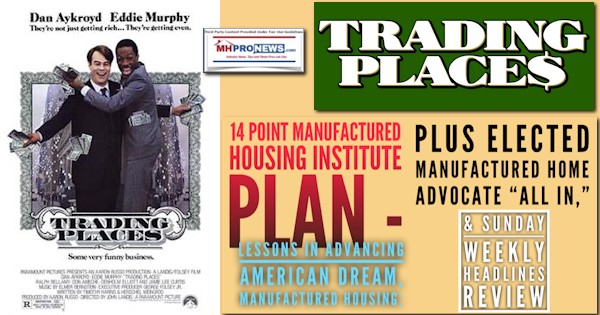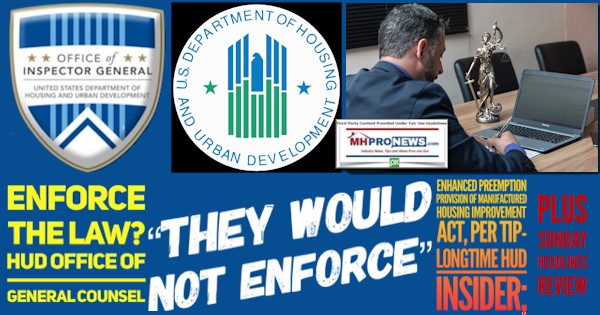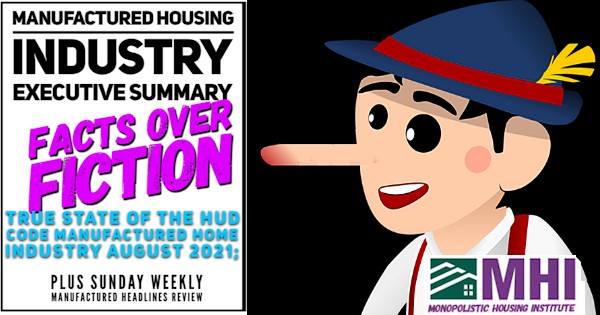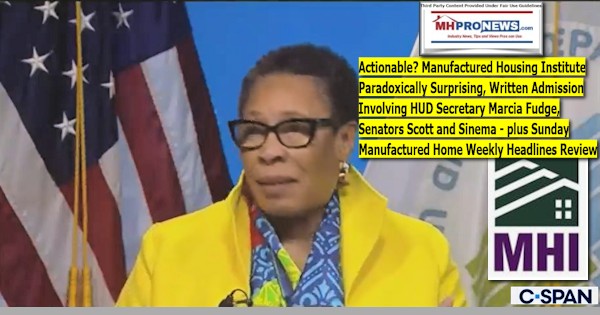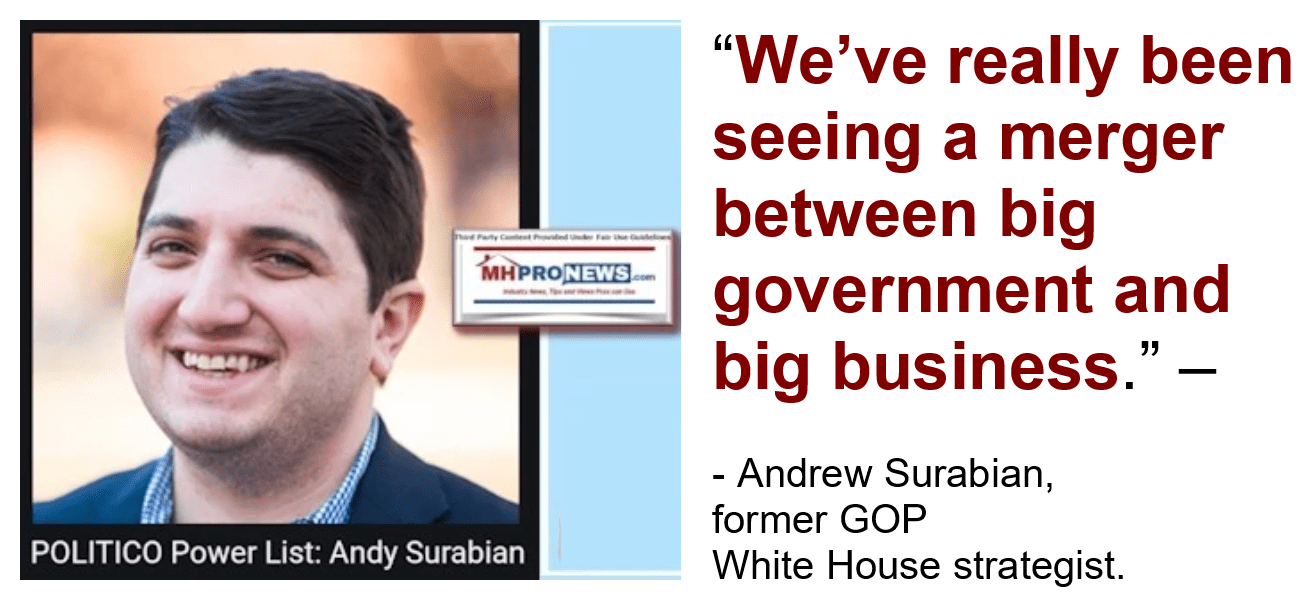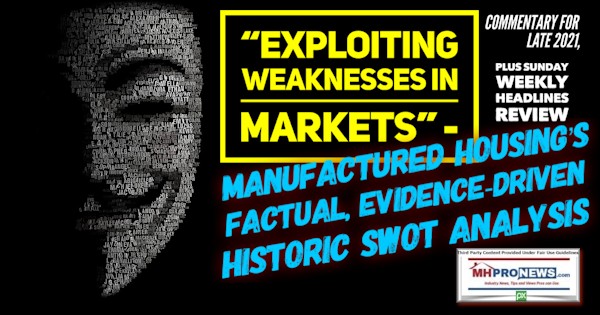
Before diving into the headline topics, let’s briefly tip the hat towards our Jewish and Christian readers who are celebrating Hannukah or Advent. More on those at a later time as part of a unique history lesson that will include manufactured housing and Islam. That teaser stated, there is no way to understand manufactured housing or the broader mainstream housing market today absent the fundamental undercurrents about ways of exploiting market weaknesses that too few grasp. Nick Hanauer warned his fellow plutocrats and oligarchs via Politico in 2014 during the Obama-Biden Administration that the pitchforks are coming for them. When billionaires address one another in such a manner – be it published, televised/video, at Davos, or wherever – it is fair to say that they often tune in to each other. Hanauer said again via a Ted talk in 2014 that the “pitchforks” are coming. The only alternative to the pitchforks that arose from such a highly unequal society, said Hanauer, was a police state.
A police and highly sophisticated ‘surveillance’ state already exists in Communist China. Numbers of American billionaires and their corporate interests are just fine with investing in China, despite that nation’s problematic and often horrific human, ethnic, or religious rights record. Capitalists, it seems, are willing to invest with Communists so long as they get a good rate of return on their investment. The reasons to oppose U.S. investment into Communist China ought to be apparent in the wake of the COVID19 outbreak. As Chinese jets, missiles, military or naval exercises (not sabers) are deployed to menace Taiwan, others in that region are watching. Japan, Australia, South Korea, and India are among the nations that nervously sift the tea leaves as to what to do if the latest communist drill becomes the real deal. Meaning, if Beijing decided to unleash their military power against Taiwan, instead of just probing their defenses.
Speaking of COVID and police states. In Australia and parts of Europe, there is growing push back against the draconian moves that have stripped once far freer people of their civic rights. Here in the U.S. and in Canada, there is evidence of pushback against ‘mandates’ too.
For those who pull back the veil in search of facts and evidence, it should be painfully obvious that the World Health Organization (WHO) totally failed the world in protecting global health in 2019. Politics with Communist China apparently kept the WHO from issuing the warning in late 2019 that might have limited the spread of COVID.
Or consider the United Nations. It was supposed to be an organization that would help prevent war and make peace possible. Per Revise Sociology, “It is sad to say, but there are currently ongoing wars or minor conflicts in around three dozen countries, most of them in the Middle East, North West Asia and Sub-Saharan Africa, and a major ongoing drug-war in Mexico. Wikipedia lists around 40 ongoing wars and conflicts with over 100 combat deaths in 2020 or 2021.” So much for beating swords into plowshares, as the inscription on the U.N. Building in New York City proclaims? That passage from Isaiah says: “He shall judge between the nations, and shall arbitrate for many peoples; they shall beat their swords into plowshares and their spears into pruning hooks; nation shall not lift up sword against nation, neither shall they learn war any more.”
But it isn’t just international bodies that have failed.
Here at home, American institutions – for whatever reasons – have failed for decades too.
In housing, HUD’s own researchers Pamela Blumenthal and Regina Gray said that the causes and possible cures for the affordable housing crisis have been known for 50 years. Yet those underlying causes, be it Democratic or Republican Administrations said Blumenthal and Gray, have yet to be successfully addressed. Perhaps it is a coincidence, but it is interesting to note that MHLivingNews made a similar observation based on decades of third party research weeks before Blumenthal and Gray made their evidence-based point.
But what Blumenthal and Gray didn’t mention is what MHLivingNews did. Namely, that in a widely bipartisan fashion Congress finally addressed what they discovered over 2 decades ago. That law still languishes and is mentioned below. It still goes largely unenforced.
When President Lyndon Banes Johnson (LBJ-D) launched his Great Society programs with the help of Congress, he has been accused of doing so for coldly and boldly racist and manipulative reasoning. It is odd at best that Johnson succeeded at turning the vast majority of black voters into loyal Democrats. It is odd because the history of the Republican party made them a more likely political home for minorities, women, or others.
But Johnson proved that bold deception can pay huge political dividends. Johnson proved too that when there is a vacuum, even an unlikely pretender can swoop in to fill it.
Despite decades of evidence, even now, too few Republicans are willing to call out the sobering realities for what it is. This is being stated by a political independent. After all, it was Republicans who freed the slaves under President Abraham Lincoln. It was the Grand Old Party (Republicans) who passed the voting rights and civil rights acts. It was Republicans who made the vote for women possible. These historic facts and others should be repeated time and again by those who want to save the Republic from the fate of barbarians that overran ancient Rome and who threaten America today.
The Great Society programs, said the Heritage Society, have resulted largely in a status quo of modestly rising and falling levels of poverty in America. It is clear that trillions in spending is roughly equal to the trillions in national debt that have been amassed since LBJ’s Great Society was enacted. Yet, despite the hype and lack of results, those public policies have failed to achieve what Johnson publicly claimed he wanted to achieve.
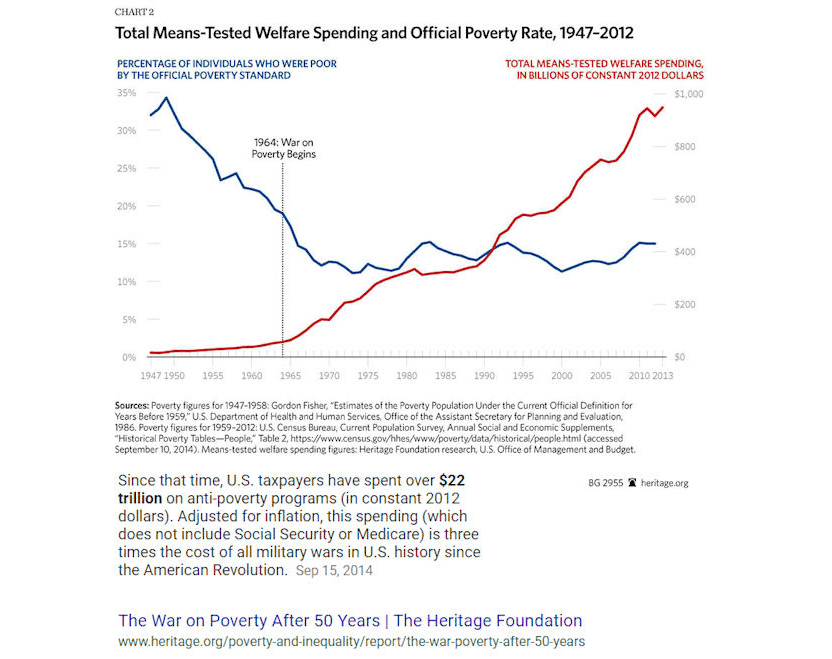
It seems that the more likely goal of the Great Society and War on Poverty aimed to get blacks and others hooked on dependency and then to vote Democratic. This was despite the history of Democrats being the party of the Ku Klux Klan (KKK), the party of slavery, and the party of the Confederacy among other dark chapters of their history. That said, let’s not forget to mention that not all Democrats believed that way. President John F. “Jack” Kennedy (D) and Senator Robert F. “Bobby” Kennedy demonstrated their willingness to fight for minorities and others. Both of those Kennedy brothers were assassinated, as was the late Rev. Martin Luther King Jr.
President Harry Truman (D) warned against politicians who grew wealthy while or after serving in office. When examined, it seems that a form of soft and thinly veiled corruption of far too many establishment politicians in Washington, D.C. took hold decades ago.
President Dwight D. “Ike” Eisenhower (R-GOP) warned against the military industrial complex. Part of that complex includes the spy or ‘intelligence’ agencies. It should be noted that despite its years of largely favorable media, the Federal Bureau of Investigation (FBI) was rather corrupt under J. Edgar Hoover as it has been under the prior two and current administrations.
While Ike decried the military industrial complex, in fairness and for objective reasons, it must be noted that he used the Central Intelligence Agency (CIA) in various clandestine operations that influenced or thwarted this or that democratic election process in various nations. Two examples that might be cited are the CIA backed 1953 Iranian coup d’état and the 1954 Guatemalan coup d’état. A simple Google, Bing, Yahoo, or Duck Duck Go search of that underlined phrase will reveals scores of articles on those topics. Right or wrong, The rationale used by Ike and the CIA was the broader fight against Communism during the Cold War.
There is a historic record that is hiding in plain sight.
That historic record is one of years of institutional failures at achieving the stated purpose of a given program or plan.
Yet despite the evidence of problems or lack of deliverables, those programs, institutions, and plans have magically endured.
For example. After the CIA backed Bay of Pigs fiasco, President John Kennedy mused that he would break up the CIA and scatter it to the winds. But he did not do so.
There are those who believe, right or wrong, that the CIA, organized crime and perhaps others colluded to kill Kennedy. Note that the Warren Commission findings of a single lone gunman was disputed by Congress’ own research into the Kennedy hit in Dallas.
According to the official Archives.gov: “Findings The Committee believes, on the basis of the evidence available to it, that President John F. Kennedy was probably assassinated as a result of a conspiracy. The Committee is unable to identify the other gunman or the extent of the conspiracy.” Yet, decades after that research, it is still common for millions to hear that Lee Harvey Oswald was ‘the lone gunman’ who killed President Kennedy. Such is the sorry state of much (not all) of American education and media.
That same Congressional committee stated that the Soviets, Cubans, CIA, organized crime did not – “on the basis of evidence available to it” – participate in the Kennedy hit. But per acoustic tests and other evidence, there were at least two gunmen. That said, many believed that the plug was pulled too early on that investigation into American assassinations.
The fact that certain records of the Kennedy kill are still classified decades after the event are ample reasons to believe that ‘our government’ is still covering up the truth. What is necessary on a range of issues is for populist leaders who have the courage to call out troubling realities, past and present, and work to undo the institutions that have for too long undermined the notions of equal justice for all.

That brief historic backdrop noted, let’s pivot toward a review of some key parts of manufactured housing history in the late 20th and 21st century eras.
As a well-placed source has told MHProNews, Warren Buffett had his eyes on manufactured housing since the late 1980s. With that thought in mind, lets lay out the following facts.
- HUD Code Manufactured Housing hits its modern apex since the enactment of the HUD Code in 1974 and the production of the first HUD Code manufactured homes that took place on June 15, 1976.
- Note that some observers aptly point out that the high-water mark of 1998 occurred due in part to ‘liar loans’ being made to finance new manufactured homes. A sizable percentage of fraudulent down payments or other documents that were faked – no doubt made up a percentage of those sold HUD Code dwellings. Numbers of problematic manufactured home loans were sold to the secondary market. What occured has been described as a precursor to “the liar loans” and “no doc” loans that led to the housing and financial crisis of 2008. But unlike the conventional housing and financial crisis, Fannie Mae and Freddie Mac (Government Sponsored Enterprises, GSEs, or “Enterprises”), have never returned to support HUD Code manufactured homes as single family, home only lending in any meaningful way. On that point there is a wide consensus from groups as distinct as Prosperity Now (previously known as CFED), the Manufactured Housing Institute (MHI), and the Manufactured Housing Association for Regulatory Reform (MHARR).
- Warren Buffett largely exits Berkshire Hathaway’s positions in Fannie Mae and Freddie Mac. These stocks yielded handsome returns for Berkshire (BRK). But Buffett noted what he referred to as cockroaches that were warning signs in his remarks to explain why he avoided what so many were ensnared by.
- The Manufactured Housing Improvement Act of 2000 (MHIA or 2000 Reform Law) is enacted. The MHIA was supposed to establish many processes and legal guideposts that included what later came to be the so-called “enhanced preemption” for HUD Code manufactured homes. The Manufactured Housing Consensus Committee (MHCC) was established by the 2000 Reform Law. There was also a provision, often ignored by HUD, for a non-career administrator for the Office of Manufactured Housing Programs (OMHP). What Blumenthal and Gray failed to mention in their September 7, 2021 HUD PD&R report is the MHIA. But they also failed to mention manufactured housing. That may be odd for the federal agency that is supposed to be manufactured housing’s primary regulator. But as objective and longtime industry observers have noted, it is sadly about par for the course. Enhanced preemption, if robustly applied, would have overcome obstacles that limited the placement of manufacutred housing. But instead, experience has shown that the industry continues to suffer being ‘zoned out’ much as it did before the MHIA was enacted.
- Buffett led-Berkshire Hathaway acquires stock in bankrupt Oakwood’s vertically integrated manufactured housing business. As MarketWatch said: Nov 23, 2002 — “On Saturday, Oakwood Homes OKWH said that Buffett’s Berkshire Hathaway, along with two other firms, have agreed to provide $215 million…” Later, the New York Times would report on April 1, 2004 — “Berkshire Hathaway’s$373million purchase of Oakwood Homes wins final court approval as part of Oakwood’s bankruptcy reorganization plan…”
- On July 31, 2003, the New York Times reported that “Berkshire Hathawaywon a protracted battle yesterday to take over Clayton Homes, a mobile home maker, after shareholders voted by a slim margin …” Let’s recall that despite the folksy tale of Buffett buying Clayton Homes due to reading Jim Clayton’s First a Dream book, that Jennifer Reingold for Fast Company takes exception to that notion. Her take is buttressed by our source that says that Buffett has been eyeballing manufactured housing since the late 1980s.

2003-2004.
Warren Buffett said about Clayton Homes, “We are in no hurry to record income, have enormous balance-sheet strength, and believe that over the long-term the economics of holding our consumer paper are superior to what we can now realize through securitization. So Clayton has begun to retain its loans.” That is cited in “Moats: The Competitive Advantages Of Buffett & Munger Businesses,” by Bud Labitan and his co-authors.
Labitan followed that quote up with this: “Buffett and Munger believe it is appropriate to finance a soundly selected book of interest-bearing receivables almost entirely with debt, just as a bank would. Therefore, Berkshire borrowed money to finance Clayton’s portfolio and re-lent these funds to Clayton at their cost plus one percentage point. This markup fairly compensates Berkshire for putting its exceptional creditworthiness to work. And, it delivered money to Clayton at an attractive price.”
That fits a description from Kevin Clayton in the video and transcript in the report linked here.
Labitan, Erin Sestak and Uno-Cba chapter on Clayton Homes in their “Moat” book (pages 77-81) featured that Buffett quote. While the source for that comment by Buffett was not attributed in Labitan’s chapter, a Google search suggested that it came from a 2003 Berkshire annual letter, which of course was published in 2004. That annual letter to shareholders from Buffett is linked here. It says the following.

We are in no hurry to record income, have enormous balance-sheet strength, and believe that over the long-term the economics of holding our consumer paper are superior to what we can now realize through securitization. So Clayton has begun to retain its loans.
We believe it’s appropriate to finance a soundly-selected book of interest-bearing receivables almost entirely with debt (just as a bank would). Therefore, Berkshire will borrow money to finance Clayton’s portfolio and re-lend these funds to Clayton at our cost plus one percentage 17 point. This markup fairly compensates Berkshire for putting its exceptional creditworthiness to work, but it still delivers money to Clayton at an attractive price.
In 2003, Berkshire did $2 billion of such borrowing and re-lending, with Clayton using much of this money to fund several large purchases of portfolios from lenders exiting the business. A portion of our loans to Clayton also provided “catch-up” funding for paper it had generated earlier in the year from its own operation and had found difficult to securitize. You may wonder why we borrow money while sitting on a mountain of cash. It’s because of our “every tub on its own bottom” philosophy. We believe that any subsidiary lending money should pay an appropriate rate for the funds needed to carry its receivables and should not be subsidized by its parent. Otherwise, having a rich daddy can lead to sloppy decisions. Meanwhile, the cash we accumulate at Berkshire is destined for business acquisitions or for the purchase of securities that offer opportunities for significant profit. Clayton’s loan portfolio will likely grow to at least $5 billion in not too many years and, with sensible credit standards in place, should deliver significant earnings.
For simplicity’s sake, we include all of Clayton’s earnings in this sector, though a sizable portion is derived from areas other than consumer finance.”
Note that to this point, this snippet of history modern manufactured housing was in the nature of a brief outline. But in 2003-2004, MHProNews has zeroed in on additional details from Labitan’s Moat book and Buffett’s annual letter.
What Labitan doesn’t say, nor in fairness did Buffett, that this “durable competitive advantage” of being able to use Berkshire’s lending power essentially allowed Clayton’s affiliated lending unit to securitize manufactured home sales entirely apart from the GSEs.
Indeed, Clayton’s sister brands of Vanderbilt Mortgage and Finance (VMF – Clayton owned retailers captive lender) and 21st Mortgage Corporation – which serves non-Clayton owned sellers – didn’t need FHA Title I or other federally linked or otherwise supported lending much either.
- While that might be good for Clayton and Berkshire, what about the balance of manufactured housing?
- When so much of the industry’s lending comes from a Berkshire owned brand, doesn’t that give an inordinate amount of clout to that source for purchase capital for single family manufactured home loans?
- Aren’t the answers to that obvious?
What Labitan and Buffett also didn’t say is that Clayton’s strategy for financing would only work so long as GSE, FHA Title I, or other lending options were kept marginalized or were otherwise de facto suppressed. Why? Because the ‘advantage’ of having VMF or 21st lending, thanks to Berkshire’s ability to access cheaper borrowed money than others might obtain, only works if less costly lending is kept out of manufactured housing. While James A. “Jim” Schmitz Jr and his Minneapolis Federal Reserve research and other colleagues didn’t address this point, it fits the broader thesis that HUD (part of the federal government), builders and their nonprofit have worked to undermine the manufactured housing option since the dawn of manufactured housing.
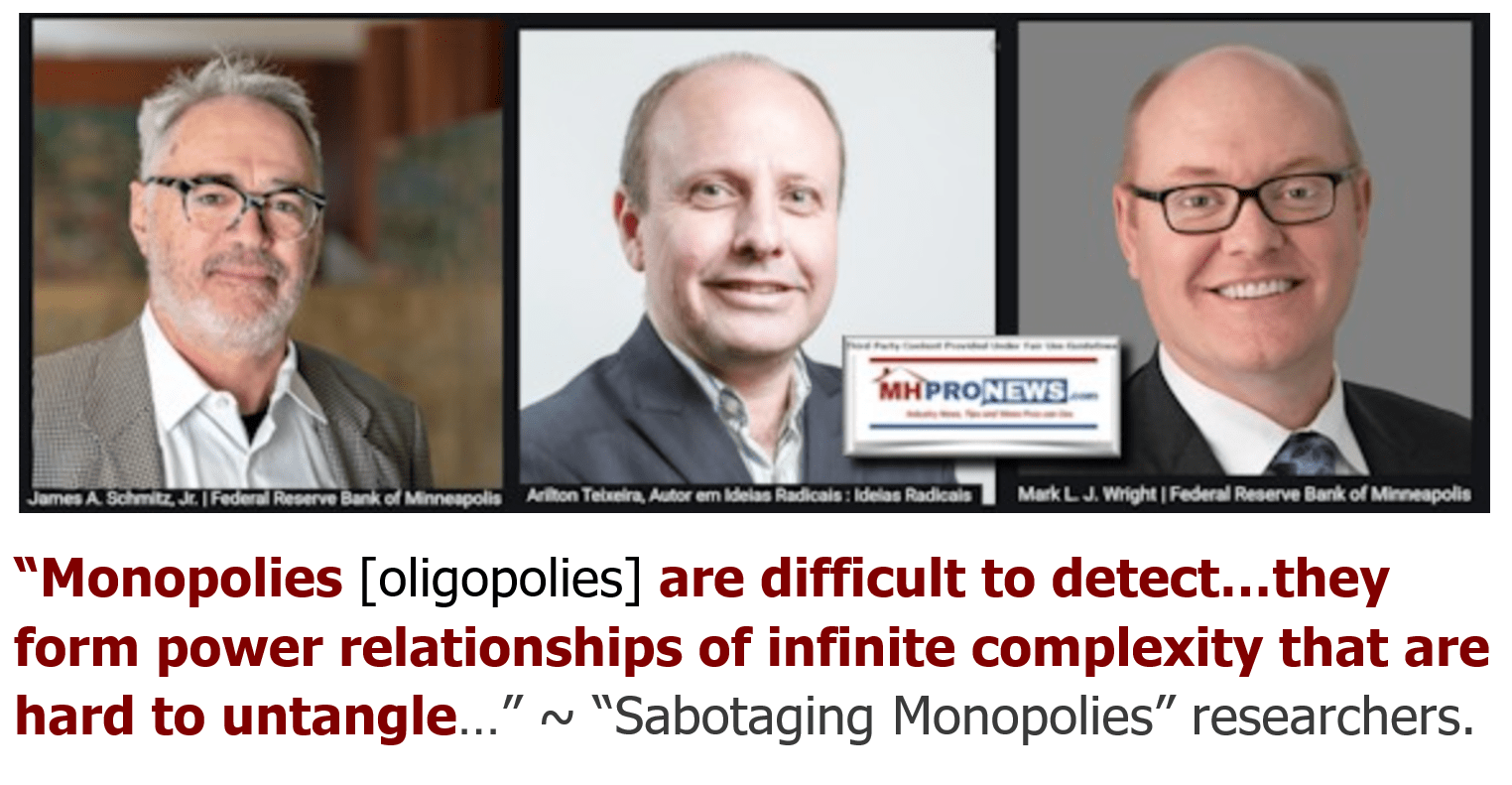
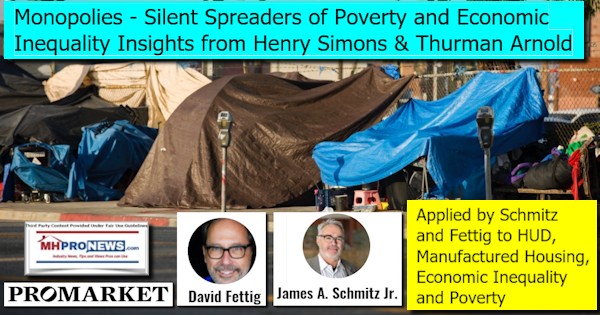
If the GSEs were doing home only or chattel loans, or FHA Title I personal property loans became commonplace and properly structured without the notorious 10/10 rule currently in place, then Clayton’s ‘advantage’ in the marketplace could vaporize.
In fact:
- if the GSEs were making tens of thousands of low-cost single family, home only loans on manufactured homes –
- and if Clayton used only VMF lending – instead of lower cost GSE or other options if they were available –
- then the logical outcome would be that Clayton would begin to lose market share to those who had better lending options.
Properly understood, 2003-2004 becomes one of a series of pivotal years in manufactured home history.
Just as someone can’t properly understand manufactured housing’s underperformance today without understanding the concept of the Buffett ‘castle and moat’ dictum and its predicate of a ‘durable competitive advantage,’ nor can someone understand manufactured home history – or American history – without grasping the notion of paltering.
Certain politicians and business leaders palter on a routine and ongoing basis. Certain organizations palter habitually too. As the Urban Dictionary aptly defines it: “Paltering (gerund or verb) and palter (verb) refer to an extremely common practice of lying and deceiving with true statements.”
Once Buffett led-Berkshire acquired both Clayton Homes and Oakwood (OKWH) manufactured homes, there has only been one brief period where the industry’s production topped the level that it did the year those companies were purchased. That was 2005, when FEMA orders pushed manufactured housing production up.
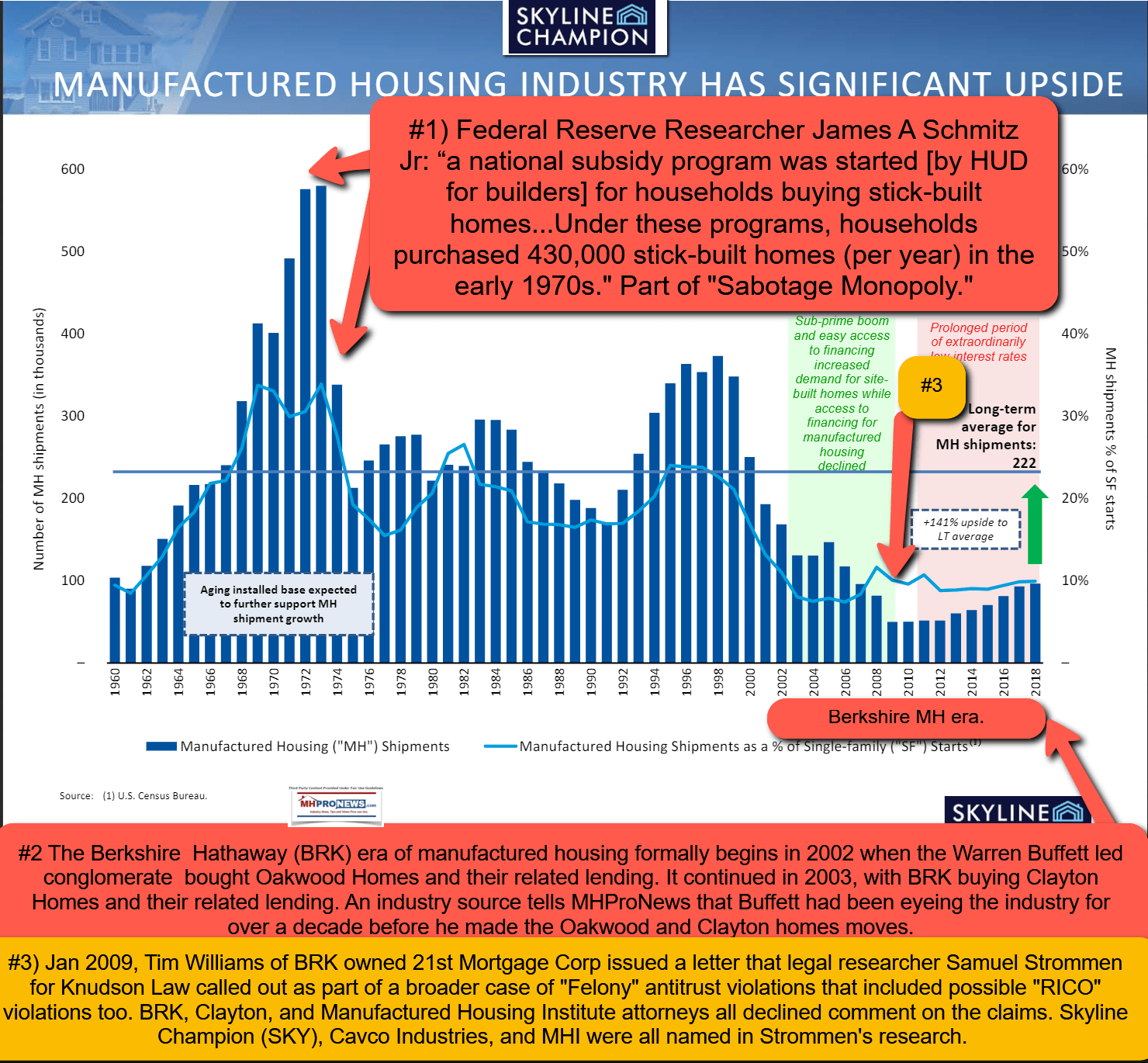
That pattern of years of underperformance by manufactured housing during an affordable housing crisis is simply inconceivable as mere happenstance or an accidental occurrence. After all, who doubts that with Buffett’s billions available, that Clayton is unable to educate the vast majority of the population to grasp the truth about modern HUD Code manufactured homes? After all, Kevin himself said in the video interview found in the linked item below that Warren told him he could have whatever he needed. Well, Kevin? Well Warren? What about that national manufacutred housing educational campaign that a decade ago Kevin said was coming?
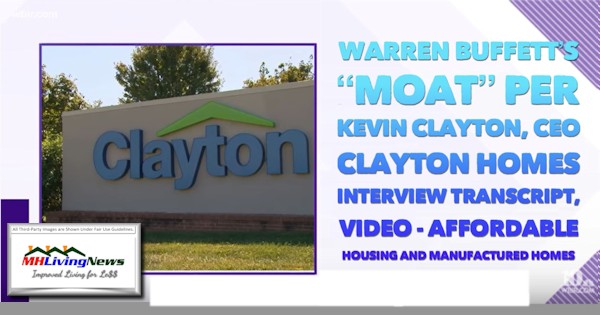
- The status quo since 2003 – punctuated by 21’st Mortgage Corporation’s “kill shot” in 2009, which Samuel “Sam” Strommen at Knudson Law said is an apparent antitrust violation – has been to limit lending and thus limit manufactured home industry sales.
- Additionally, by not enforcing the Manufactured Housing Improvement Act of 2000’s “enhanced preemption” provision, zoning and placement barriers became an ever-increasingly hurdle too.
Danny Ghorbani addressed that topic in an exclusive Q&A that was published at the link below.
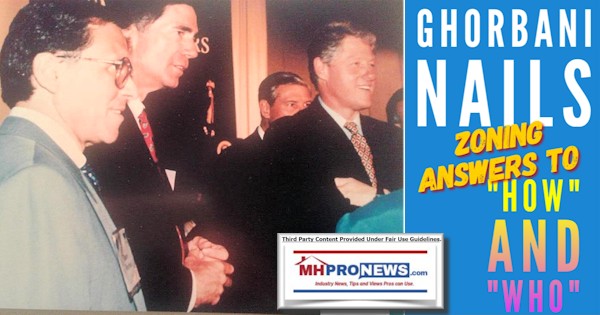
In brief, Ghorbani – a former MHI vice president who was also the founding president and CEO of the Manufactured Housing Association for Regulatory Reform (MHARR) – made a systematic yet simple case. Summing it up, given that MHI claims the mantle of being the industry’s post-production representation, let them do their job.
That being so, reasoned Ghorbani, let MHI sue to get enhanced preemption and the other provisions of the MHIA fully and properly enforced.
What ought to be stressed is those historically framed comments by Ghorbani should be viewed through the lens of Mark Weiss, J.D., and his offer to so-called MHI state association affiliates. Weiss is the current president and CEO of MHARR. Weiss approached the states with an offer to enter into litigation to get enhanced preemption enforced.

That pre-COVID effort outcome? Nada. There were, said MHARR, no takers. Nor has there been any publicized disagreement with MHARR’s published claim. Meaning, all of the known evidence points to MHARR being factually correct in that claim.
But that begs a series of questions that ought to be posed to every manufactured housing state associations and to MHI.
Since those sources have all-too-often stopped directly responding to MHProNews, perhaps someone else will have the guts to make such an inquiry publicly at an MHI and other meetings? One need not be media in order to ask questions.
Indeed, what should arguably happen at each and every association meeting is the following.
This suggested series of questions should politely but publicly be asked at every manufactured housing trade association meeting.
- When will MHI and/or a state association(s) sue to get the MHIA and enhanced preemption fully and routinely enforced?
- When will MHI and/or state association(s) sue the FHFA to enforce the mandate on the GSEs to do single family, home only manufactured home lending?
- When will MHI and/or state association(s) clearly state to the DOE that they will sue if they place the current and costly mandates for ‘energy standards’ that HUD Code manufactured housing has had for decades?
- When will MHI and/or state association(s) begin to routinely address the public misconceptions about manufactured housing?
- When will MHI and/or state association(s) being to routinely invoke their code of ethical conduct against those brands that fail to treat consumers with fair, just, respectful, and legal behavior?
In pondering such questions recall that some similar questions are why this writer arguably came to be persona non grata at MHI connected events. No one said this writer was disruptive. But apparently questions that are not easy to answer are reasons to be invited to leave?
Then, when it comes to the state associations and MHEC, keep in mind these comments. Note that the state exec, and MHEC member, who made that Q&A is quite well known. The name is not withheld because it is a secret. There are some who have at various times raised their voices in concern, but they apparently allowed themselves to fall back into the pack or herd mentality.

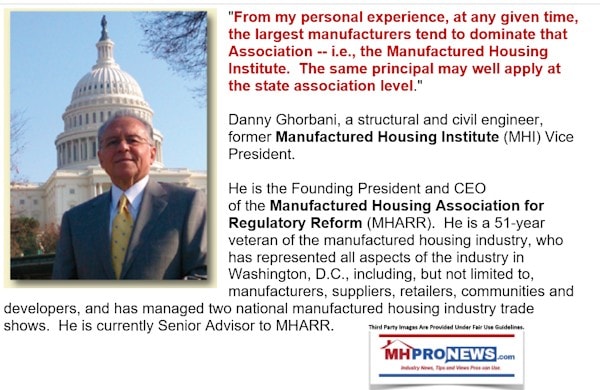
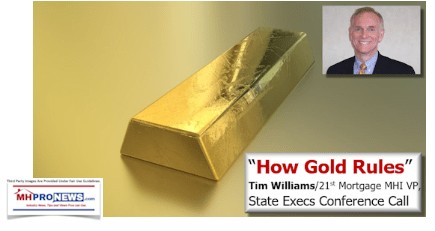
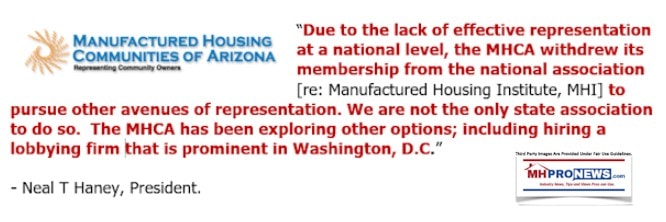
In fairness, MHI’s apparent head-fakes, spin, and paltering are hardly unique. MHI is arguably following the paltering pattern that Buffett, other businesses, plus numbers of politicians practice. It is why the public is increasingly distrustful of both business and government.

MHI claims to be working for all segments of the industry. But when carefully examined, what becomes clear is that MHI ignores its own code of conduct. MHI claims to be working for all segments of the industry. But MHI’s own statements stand in contrast with those of several of their publicly traded and dominating brands. It seems that paltering and posturing is needed by MHI in order to protect the status quo, because that benefits a relatively few consolidators who dominate MHI.
Beyond the evidence from publicly traded company statements, there are other facts that support that claim. For instance.
Tiny House Hands Up (THHU) and the Institute for Justice (IJ) recently sued the town of Calhoun, GA for trying to deny residents their the right to buy tiny houses. Why hasn’t MHI done similarly in Ayden, NC? Or why didn’t MHI engage and then sue officials in Bryan, TX? Or why has MHI claimed to support enhanced preemption without actually doing anything meaningful about it in one of the numerous cases that knew are occurring in other parts of the country?

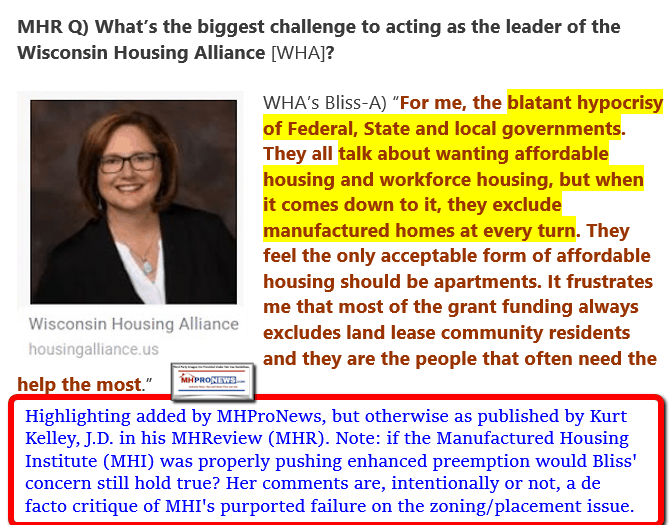
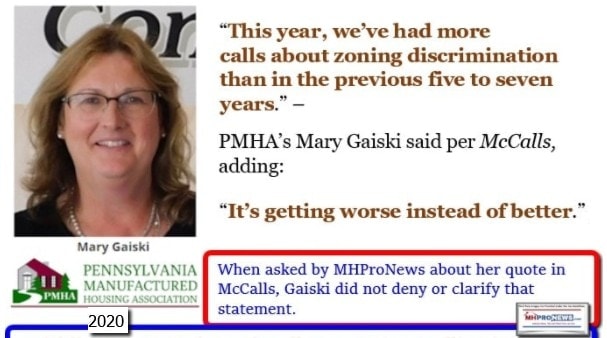
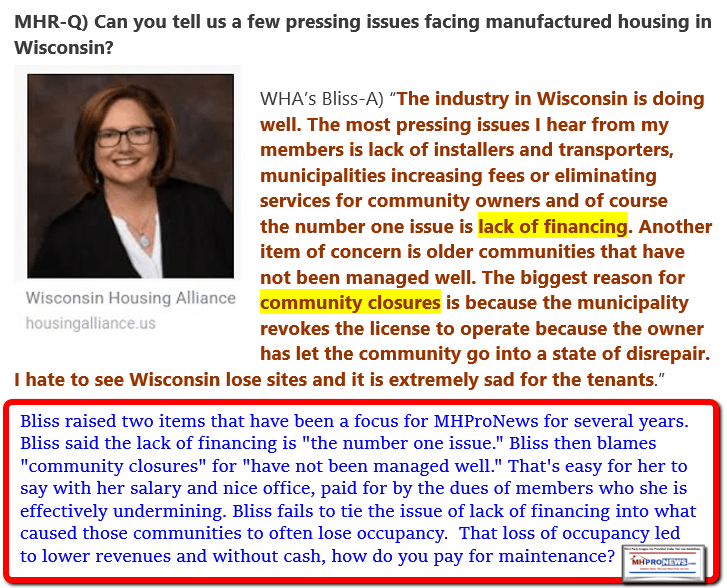
The truth is hiding in plain sight.
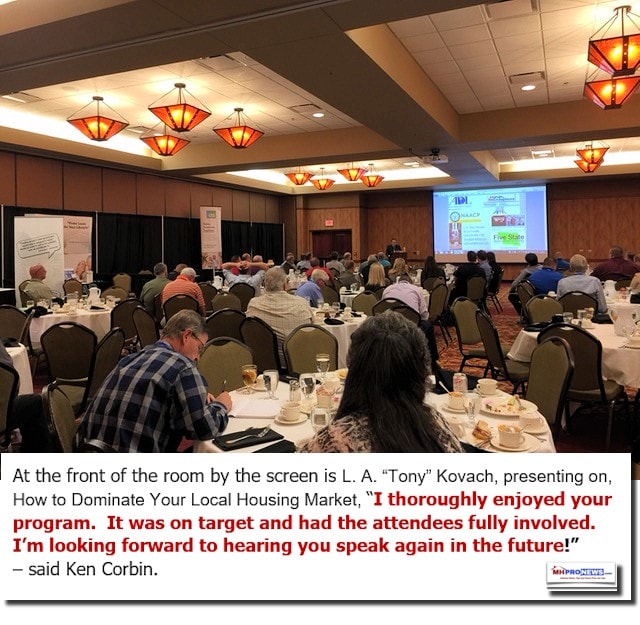
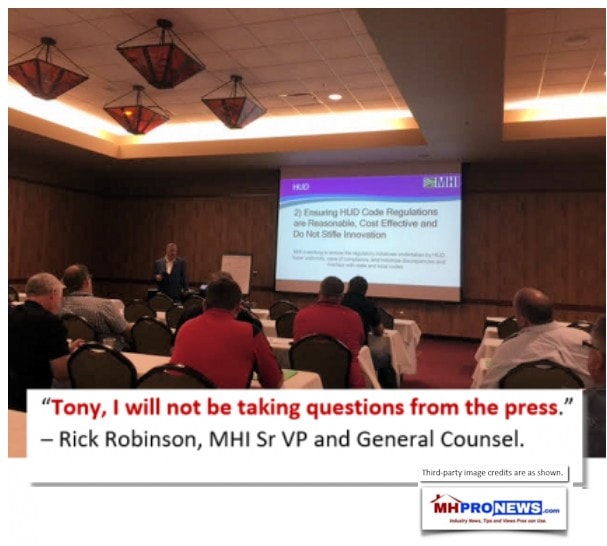

Habits and propaganda can be used to channel people into behaviors that after a time go unquestioned, even if the behaviors ought to be questioned. Who says? How about Warren Buffett?
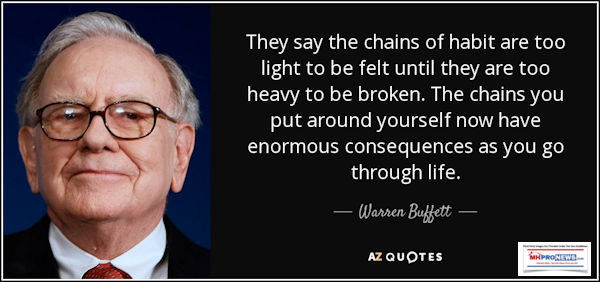
The solution to the affordable housing crisis has been hiding in plain sight for years. A big part of that solution ought to be HUD Code manufactured homes. Certainly, common sense efforts toward affordable housing preservation plus other options to increase the supply of housing which alone will bring down the pressure for every increasing costs are important too.
That said, let’s look again at Clayton and their parent company.
- But Clayton Homes has conventional housing interests, not just manufactured housing. That is an apparent conflict of interest when it comes to MHI and their advocacy.
- Berkshire Hathaway (BRK) has conventional real estate interests, not just manufactured housing. Indeed, real estate resales dwarf the manufactured housing market. That too may be viewed as a conflict of interest when it comes to MHI and their advocacy.
- Berkshire Hathaway’s lending in manufactured housing was exposed years ago by this platform and by our MHLivingNews sister site. Doug Ryan has said MHI is apparently suppressing other lending opportunities. Lesli Gooch denied that claim. But when a letter recently circulated to press FHFA to provide market-rate lending on home-only manufactured home loans, why was MHI absent from an appeal that included some of their own members? Why didn’t MHI sign onto that letter, when MHI ‘housing coalition partners’ put their John Henry’s to that document?

- Berkshire’s interests and that of many manufactured housing independents are not in alignment. Yet, MHI has the chutzpah to claim that they represent all segments of the industry. What a bold, apparently bald faced pile of big lies nonsense! MHI’s claim is made despite clear evidence to the contrary, from people like Tim Williams.
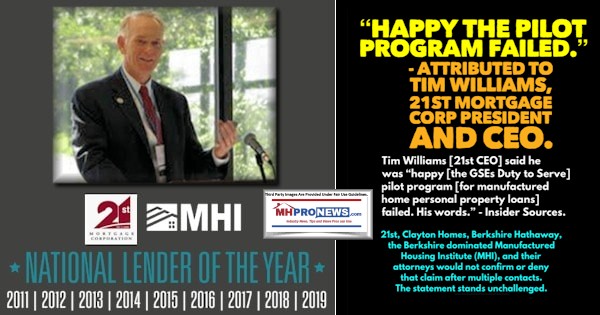
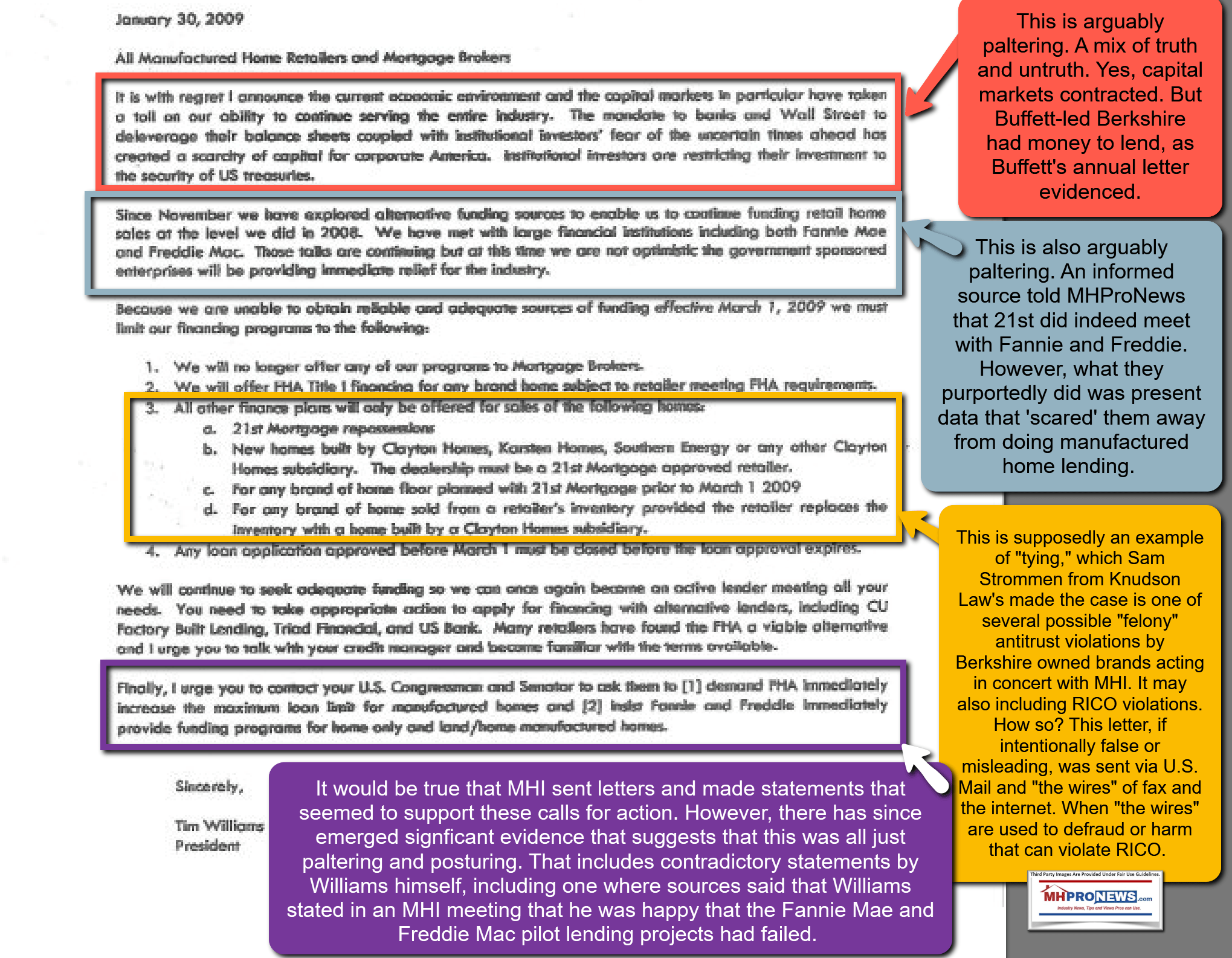

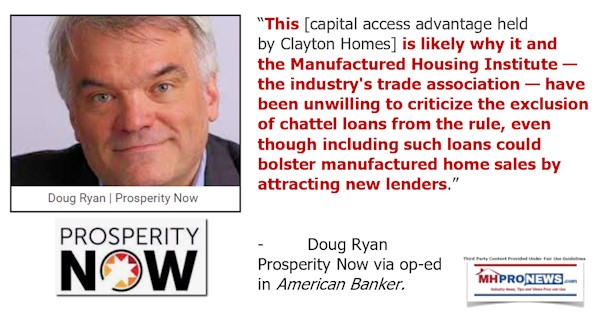
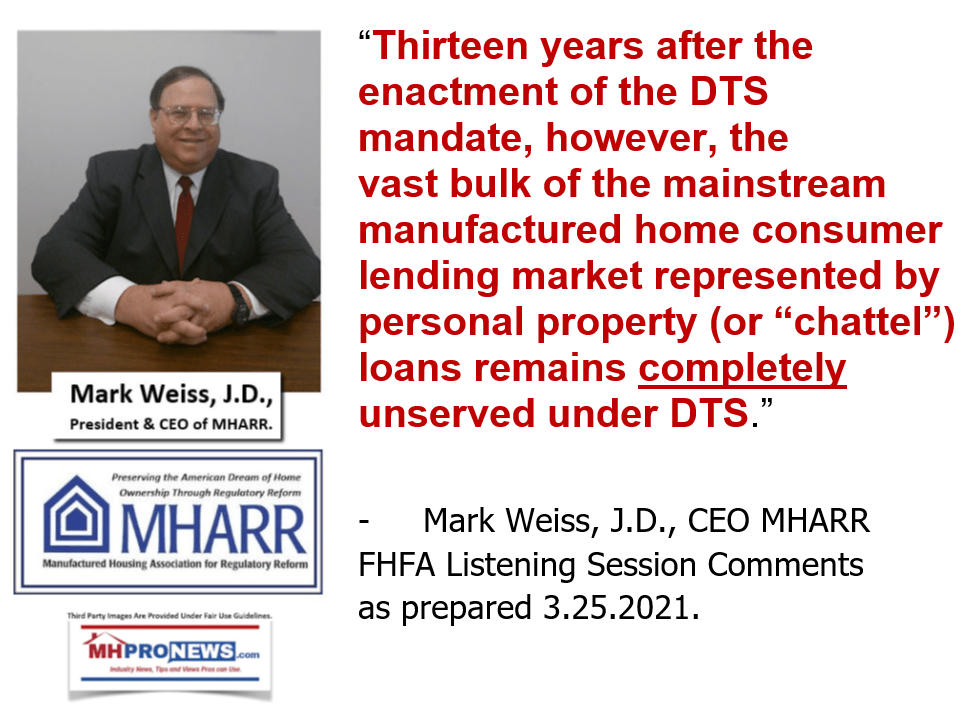
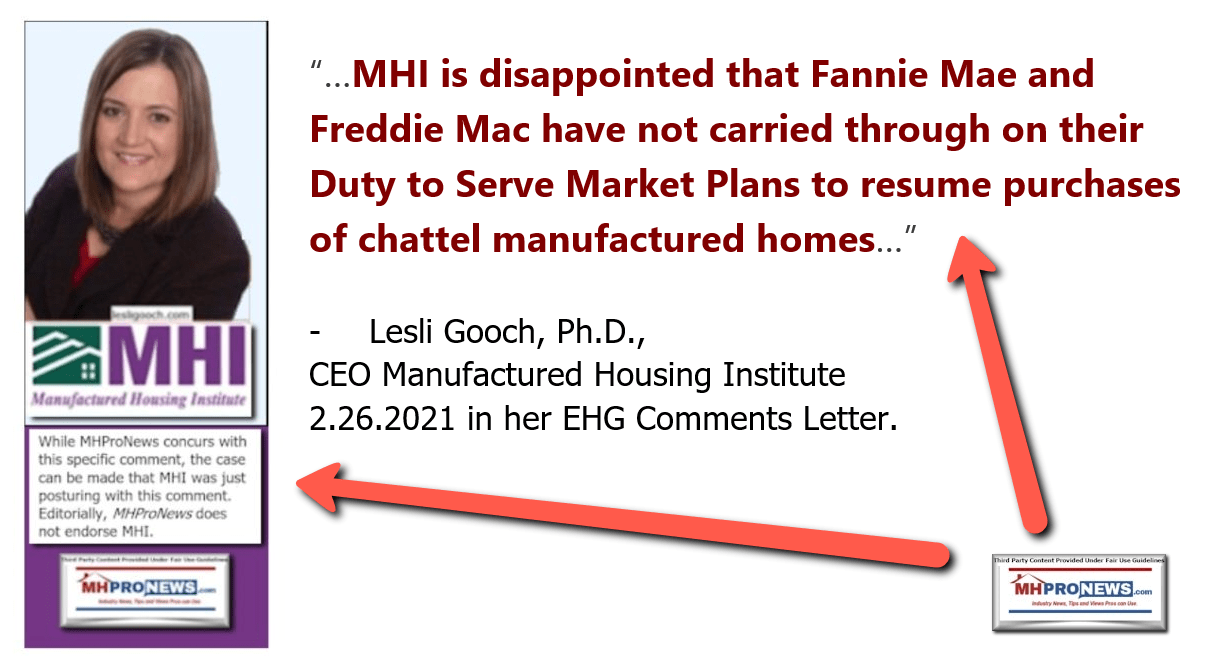
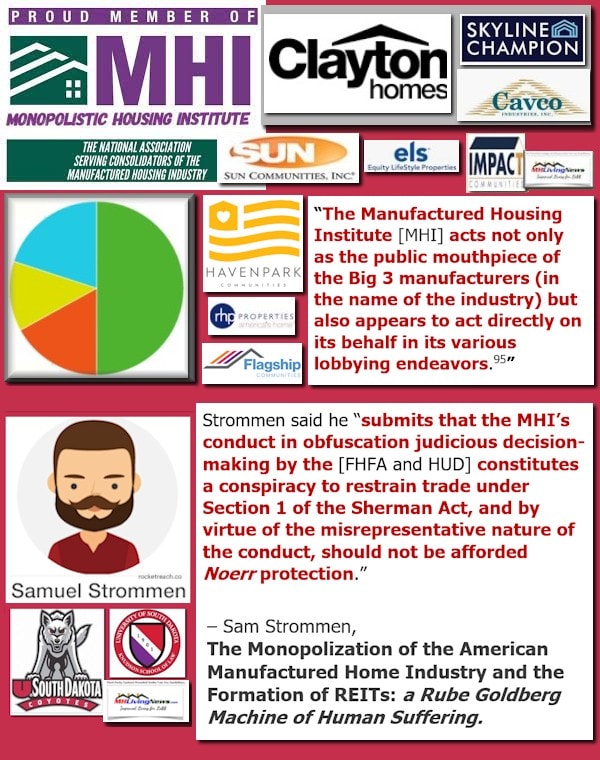
The truth is hiding in plain sight. MHI can no longer escape that truth. For those looking for a confession, don’t hold your breath. Why? Because any effort to monopolize a market via collusion or other scheme can carry hefty prison terms plus fines.
- As the FTC website says: “The Sherman Act imposes criminal penalties of up to $100 million for a corporation and $1 million for an individual, along with up to 10 years in prison.”
- The Justice Department website says: “Sherman Act [antitrust] violations involving agreements between competitors usually are punished as criminal felonies.”
The violation doesn’t have to create a monopoly, says Cornell University’s Legal Information Institute (LII) website. The mere scheme or effort to restrain trade is sufficient to bring in the potential criminal penalties of the Sherman antitrust laws. “Every contract, combination in the form of trust or otherwise, or conspiracy, in restraint of trade or commerce among the several States, or with foreign nations, is declared to be illegal. Every person who shall make any contract or engage in any combination or conspiracy hereby declared to be illegal shall be deemed guilty of a felony, and, on conviction thereof, shall be punished by fine not exceeding $100,000,000 if a corporation, or, if any other person, $1,000,000, or by imprisonment not exceeding 10 years, or by both said punishments, in the discretion of the court.”
So, given the penalties, it is understandable if those who have engaged at some level in such a collusion to undermine HUD Code manufactured housing are less than honest.
Besides the criminal and other liabilities involved, the truth has to be unpacked and laid out. Why? Because “deception and misdirection” along with paltering have become so commonplace in business and in government.
It remains to be seen if MHI, given sufficient pressure, will begin to do their claimed job.
- Will publicized revelations like these cause MHI to sue over the DOE energy rule, if needed?
- Will publicized revelations like these cause MHI to sue HUD to get enhanced preemption and other provisions of the MHIA fully enforced?
- Will publicized revelations like these cause MHI to sue FHFA, the GSEs, etc. to get the Duty to Serve Manufactured Housing properly enforced by making single-family, home only or ‘chattel loans’ on manufactured homes available again at a competitive rates?
- When will MHI stop talking about education and marketing and do something that will actually accomplish what they’ve talked about for some 16 plus years?
Many of these topics are among the headline reports that follow below.
The truth is hiding in plain sight. Frankly, there are reasons to doubt that MHI will act in those ways that the bullets and questions above laid out. That said, if they did so, no one would cheer louder for an effective and successful effort to make such key issues a reality than this writer and our publications.
“I didn’t even want to meet Warren [Buffett] because I thought, ‘Hey this guy buys and sells things, and so he found imperfections in terms of markets, that’s not value added to society, that’s a zero-sum game that is almost parasitic.’ That was my view before I met him … he wasn’t going to tell me about inventing something,” said William “Bill” Gates III, per CNBC, on 11.8.2019.
It appears that some need reminders about MHProNews long history of supporting a third, post-production trade group that could benefit manufactured housing independents. While there have been dustups from time to time on how best to accomplish that between those who supported such post-production trade group efforts, the generic support has been periodically promoted on MHProNews since early in our publishing history. Two specific examples are the move supported by Dick Moore and another that was for a time promoted by J.D. Harper of the Arkansas Manufactured Housing Association. Indeed, the case can be made that MHProNews raised these issues while an MHI member.

It is the start of Hanukkah, the Jewish festival of light. It is Advent. The annual time of preparation for Christmas, which billions of Christians believe commemorates the birth of the Redeemer of all.
Only light can drive out darkness.
Only sound information combined with courage and the will to act can drive out darkness in human activities.
Don’t miss today’s postscript.
With no further adieu, let’s pivot to the headlines that link the reports that follow from the week that was 11.21 to 11.28.2021.
What is new on MHLivingNews


What is new on the Masthead

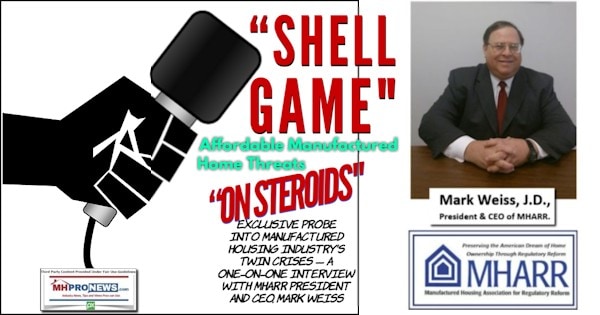
What is new in Washington, D.C. from MHARR
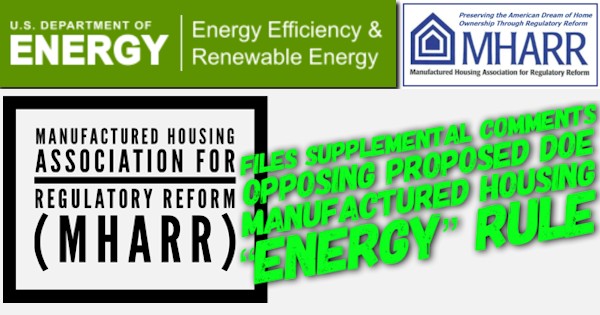
What is new on the Words of Wisdom from Tim Connor, CSP


What’s New on Industry Voices
(Other Perspectives Are Welcomed)
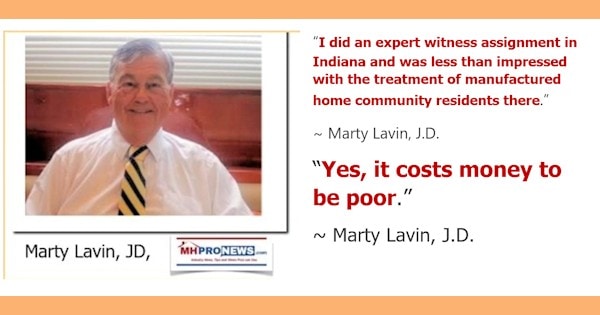
Here are the headlines from the Daily Business News on MHProNews
Saturday 11.27.2021
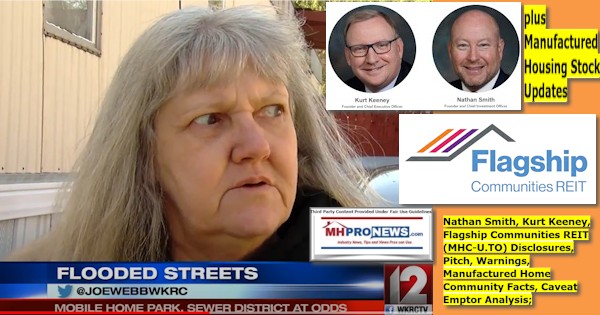
Friday 11.26.2021

Thursday 11.25.2021

Wednesday 11.24.2021

Tuesday 11.23.2021

Monday 11.22.2021

Sunday 11.21.2021
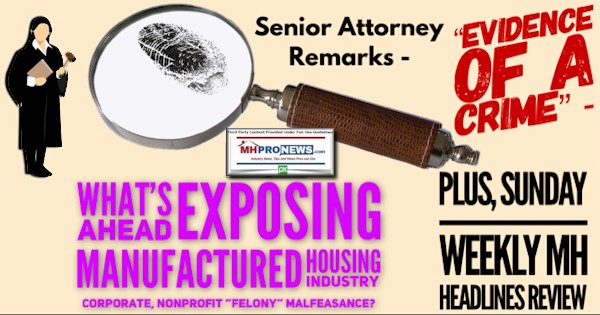
Postscript
One fine day at a Manufactured Housing Institute (MHI] meeting that was being held in Boca Raton, FL, then Vice President Lesli Gooch and this writer engaged in what could be described as a fairly brief but rather heated exchange.
Gooch, it seemed, was upset by the video interview that was conducted by MHProNews with Marty Lavin. Lavin, as thousands of industry pros realize, is an attorney who was an MHI member for years. Indeed, Lavin is also an MHI award winner.

That interview with Lavin, along with other pro-Preserving Access to Manufactured Housing Act efforts by MHProNews and MHLivingNews apparently did not meet with Gooch’s thinking – or so she pointedly indicated. Gooch went so far as to say that in the earshot of other MHI members that if Preserving Access failed to pass Congress, Gooch would blame me (L. A. “Tony” Kovach) for that outcome. Perhaps she knew that Preserving Access was going nowhere?
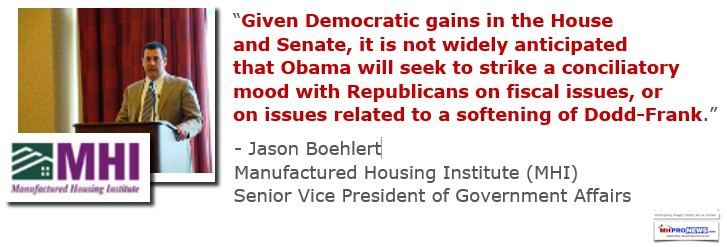
Whatever her thinking or motivations might have been, that episode in Boca Raton, FL was one of a series of awakening moments over the past 7 years. It was one of several occasional ‘Aha!’ Moments which came by way of tips, experiences, statements by others, plus good old fashioned research. Some of that came directly from MHI staff or leaders themselves.
In response to Gooch’s outburst and similar oddities from then MHI President and CEO Richard “Dick” Jennison, this writer systematically began to debunk her stared concerns. That was accomplish by appealing directly to MHI’s leaders. An example is provided below.
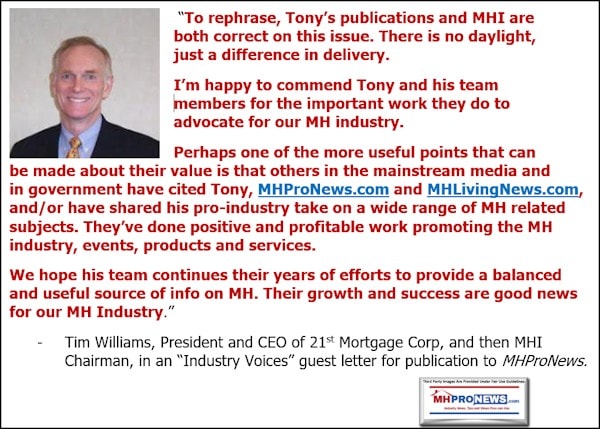
So much for Gooch’s disputed and rejected (by moi) contention.
That noted, when carefully considered, what Gooch wanted amounted to control over their pro-legislation narrative. That control she wanted, in the logic of her stated view, would extend to even the interests of a private MHI member company, namely MHProNews and MHLivingNews parent company. Imagine if Gooch demanded publicly for you or your business to do what she wanted? It was apparently absurd and brazen on its face.
But as questions put to MHI heavyweight board members Tim Williams and Nathan Smith later revealed, Gooch’s stated stance at Boca Raton were wrong. To be completely candid, there were times that the truth behind a statement made would not be fully grasped until later, in hindsight.
Perhaps for petty reasons, Gooch would from time to time speak dismissively about MHProNews and other industry publishers by inference but not by name during meetings. Signs began to appear at meetings. The inside joke was that the signs were aimed at our publications. MHI leaders denied that claim.
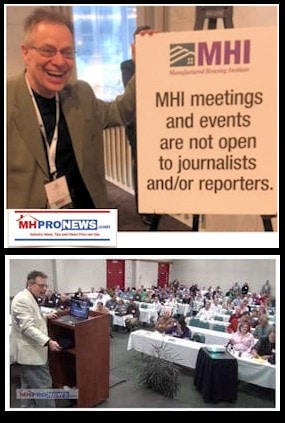
But in hindsight, it now seems obvious that MHI did not want an authentic or robust discussion over the direction of the manufactured housing industry’s efforts. This is despite the claim by David Goch, an outside MHI attorney, made to Spencer Roane.
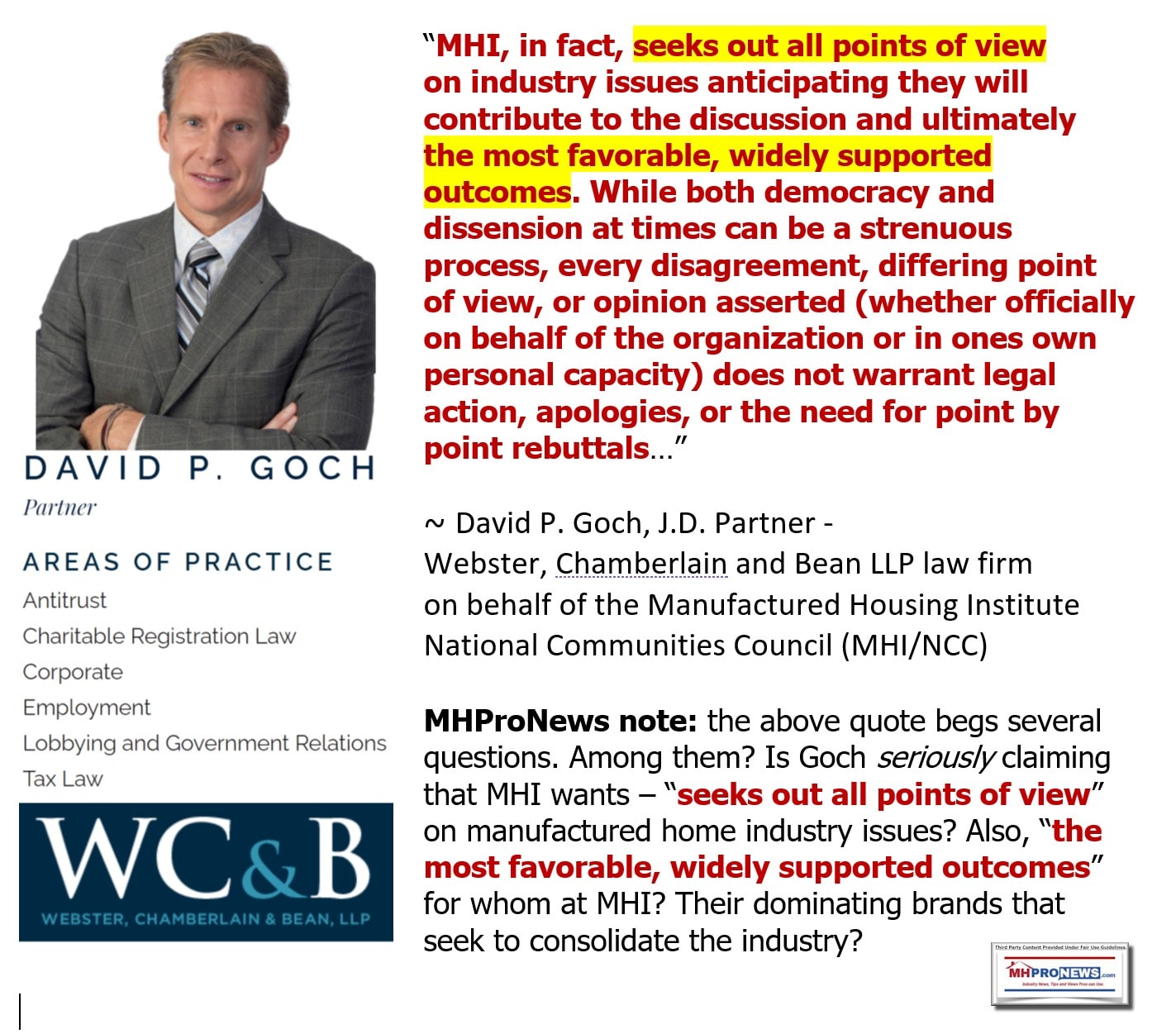
Goch made what is in hindsight at best a disjointed and flawed assertion that MHI encouraged debate. Yet, they relentlessly monitored and would act against those who disparaged MHI.
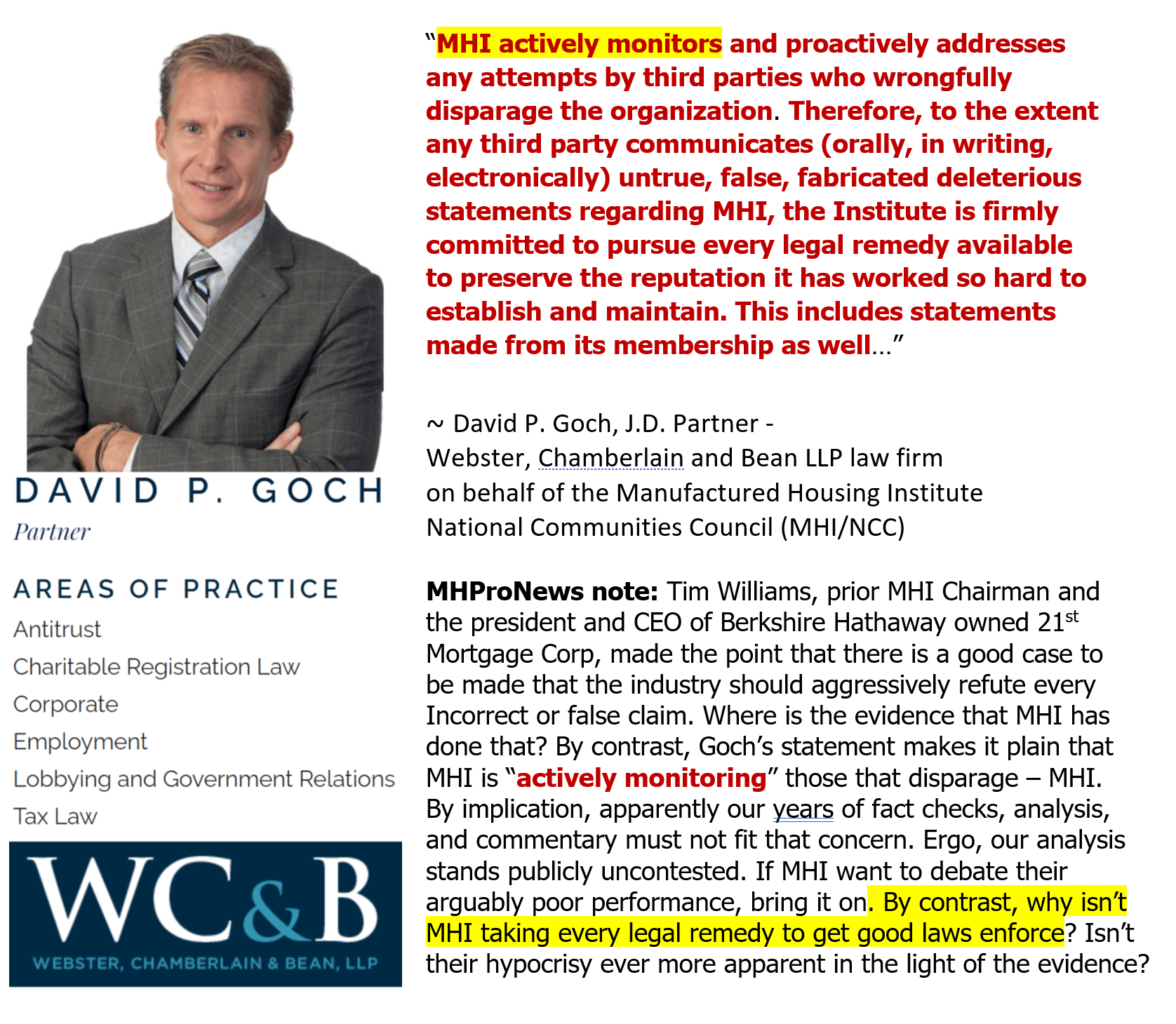
Certain MHI leaders, despite the fact that earlier this century MHI faced bankruptcy and was financially rescued from that abyss by a prominent member, was arrogant and controlling. Ironically, Warren Buffett has blasted arrogance, bureaucracy, and complacency as ‘corporate cancers’ that can destroy large organizations. So said Business Insider on July 10, 2021. It doesn’t matter if that arrogance comes from this or that person or group. Arrogance, complacency, and a bureaucratic mindsight are often problematic. On that, Buffett is correct.
If Goch or Gooch had the courage of their convictions, they could arrange to debate with this writer publicly or virtually by appointment whenever they have the chutzpah to do so.
My hunch is that live or virtual, such a robust discussion would be one of the best attended events in years. But they apparently lack the courage of their paper-thin egos and convictions. Again, the evidence for that is robust, and is illustrated in the report linked here.

History and the passage of time has numerous possible leavening effects for those capable of objectivity.
The troubling truth is that our American Republic stands on the brink of going the way of Ancient Rome.
The Roman Empire was overrun by Gothic and other hordes who invaded and eventually sacked the once “Eternal” city of Rome. Once perhaps the greatest of the ancient empires, hubris and bad policies brought them tumbling down. Just as Nazi (National Socialist) Germany were once thought to be unbeatable, in a few years the combination of American industry and ingenuity, British, Russian, and other Allied resolve took Imperial Japan and the fascist Axis of Germany and Italy and whipped them in a humiliating “unconditional surrender” fashion.
To Warren Buffett’s point about people not learning the lessons of history, there are times the man is correct.
Buffett has also spoken about the chains of habit being too hard to break once they are forged. On the last point, while habit can be a cruel task master, it is also clear that people have and do at times change. When Buffett is wrong, he is wrong. When Buffett is right, he is correct. When Buffett is paltering, don’t be surprised.
The scorpion is not human. It is what it is. As the fable about the frog trusting a scorpion occurs at one’s own risk. Far better to be the turtle than a frog, if one is to give a scorpion a ride across a river.

In a fractured world, truth is often compromised. It ought not to be so. If there is to be an enduring recapture of the American Dream and the authentic principle claimed of equal justice under the law, it will likely be people of deep faith who lead the charge. Among the questions that arises is this. Can people of faith come together as they did during the American Revolution?

There are three so-called great or global religions. These are Judaism, Christianity, and Islam. Note that all three have Middle Eastern origins. It is not without reason that historians have called that part of the world the cradle of civilization.
Each of those religions are divided.
- There are strict or observant Jews and others who are to various degrees less so.
- Christianity has thousands of branches. Yet, it was only a little over 500 years ago when there were only two sizable Christian bodies – Catholics and Orthodox. All of the other Christian churches today have arisen since Martin Luther tacked his 95 theses on the door of the parish church at Wittenberg.
- Islam has its factions too.
It is not to imply that all religions are equal to share the following quotes. Let’s be clear. You or i could make up a religion today and then go stand on a street corner in New York or Los Angeles and proclaim that ‘religion’ to whomever would want to listen and believe it. Truth is what is. Truth is what is in all sectors of life. Part of our obligations as a nominally free people is to seek, know and then act upon what is true.
But the quotes below illustrate that even apparently different beliefs have points of commonality. Deception has long been decried. The harm that can be caused by deception is aptly illustrated during the COVID19 era.

People of good will have learned how to set aside difference in order to focus on some greater good. This is how America was born. That is how manufactured housing can be reborn.
Do we trust MHI? Do we trust their dominating brands? Perhaps the more important question is – do you trust them? If so why? If not, then what will you do about it?
Much can be summed up with simple truths. Manufactured housing is underperforming during an affordable housing crisis. MHI and MHARR came together to get the Manufactured Housing Improvement Act of 2000 passed into law. Later, they supported the Duty to Serve provisions of the Housing and Economic Recovery Act (HERA) of 2008. But once passed into law, MHI has oddly failed to do what their ‘post-production’ claim of serving all segments of manufactured housing should require of them. If they don’t start doing their claimed jobs, let the system be applied as robustly against them and their dominating brands as possible.
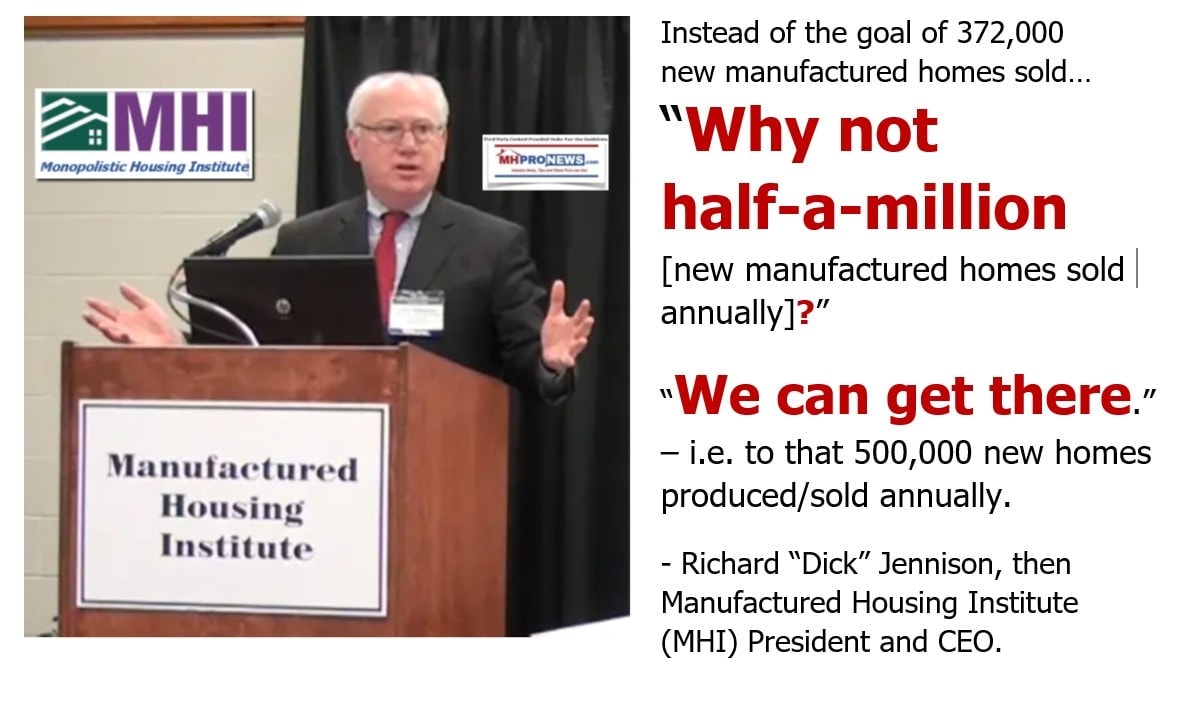
![DidntWantToMeetWarren[Buffett]BecauseGuyBuysSellsFoundImperfectMarketNotValueAddSocietyZeroSumGameParasiticBillGatesPhotoMicrosoftLogoGatesFoundationLogoQuoteQuotableQuoteMHproNews](http://www.manufacturedhomepronews.com/wp-content/uploads/2020/07/DidntWantToMeetWarrenBuffettBecauseGuyBuysSellsFoundImperfectMarketNotValueAddSocietyZeroSumGameParasiticBillGatesPhotoMicrosoftLogoGatesFoundationLogoQuoteQuotableQuoteMHproNews.jpg)
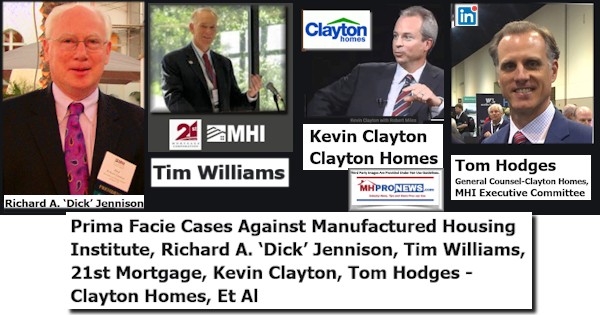



Our thanks to you, our sources, and sponsors for making and keeping us the runaway number one source for authentic “News through the lens of manufactured homes and factory-built housing” © where “We Provide, You Decide.” © ## (Affordable housing, manufactured homes, reports, fact-checks, analysis, and commentary. Third-party images or content are provided under fair use guidelines for media.) (See Related Reports, further below. Text/image boxes often are hot-linked to other reports that can be access by clicking on them.)

By L.A. “Tony” Kovach – for MHProNews.com.
Tony earned a journalism scholarship and earned numerous awards in history and in manufactured housing.
For example, he earned the prestigious Lottinville Award in history from the University of Oklahoma, where he studied history and business management. He’s a managing member and co-founder of LifeStyle Factory Homes, LLC, the parent company to MHProNews, and MHLivingNews.com.
This article reflects the LLC’s and/or the writer’s position, and may or may not reflect the views of sponsors or supporters.
Connect on LinkedIn: http://www.linkedin.com/in/latonykovach
Related References:
The text/image boxes below are linked to other reports, which can be accessed by clicking on them.
